Summary Overview
Clinical Staffing Services Market Overview:
The global clinical staffing services market is experiencing consistent growth, driven by demand across sectors such as healthcare, pharmaceuticals, research, and diagnostics. This market encompasses various services, including temporary staffing, permanent placements, and project-based hiring for clinical professionals. Our report provides an in-depth analysis of procurement trends, focusing on cost-effective staffing strategies and the integration of digital tools to optimize recruitment and workforce management processes.
Key challenges in clinical staffing include managing talent shortages, ensuring regulatory compliance, and addressing the rising demand for specialized skill sets. Digital staffing platforms and strategic talent acquisition approaches are essential for enhancing the clinical workforce supply chain and ensuring operational excellence. As the demand for healthcare services continues to grow, organizations are leveraging workforce intelligence to improve efficiency and reduce risks.
The clinical staffing market is expected to sustain steady growth through 2032, with key highlights including:
-
Market Size: The global clinical staffing services market is projected to reach USD 70.13 billion by 2032, growing at a CAGR of approximately 7.6 % from 2024 to 2032.
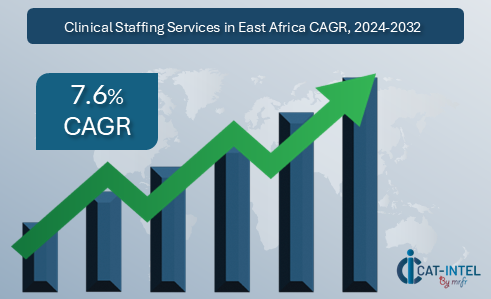
Growth Rate: 7.6%
-
Sector Contributions: Growth in the market is driven by: -
Healthcare Expansion: Rising demand for skilled professionals in hospitals, outpatient facilities, and long-term care settings. -
Pharmaceutical Research: Increasing clinical trials and research initiatives necessitating specialized clinical roles. -
Technological Transformation and Innovations: Advancements in digital recruitment tools, such as AI-driven matching algorithms and automated onboarding processes, are improving hiring efficiency and accuracy. -
Investment Initiatives: Organizations are investing in talent management systems, training programs, and workforce analytics to enhance productivity and employee satisfaction. -
Regional Insights: North America remains a dominant contributor due to its advanced healthcare infrastructure and rising demand for clinical professionals.
Key Trends and Sustainability Outlook:
-
Enhanced Digital Integration: Automation in talent sourcing and management is improving recruitment efficiency, reducing administrative burdens, and ensuring compliance. -
Upskilling and Reskilling Programs: Focus on continuous professional development to meet the evolving demands of healthcare and research sectors. -
Focus on Sustainability: Emphasis on ethical recruitment practices and initiatives to minimize workforce turnover. -
Customization Trends: Growing demand for tailored staffing solutions to meet specific clinical and regulatory requirements. -
Data-Driven Workforce Management: Leveraging analytics to optimize staffing levels, enhance workforce engagement, and maintain high standards of patient care.
Growth Drivers:
-
Healthcare Demand: Expanding access to medical services globally is driving the need for skilled clinical staff. -
Pharmaceutical R&D: Increasing investment in drug development and clinical trials is fueling demand for specialized staffing. -
Regulatory Standards: Compliance with stringent healthcare regulations is boosting the need for experienced and certified clinical professionals. -
Workforce Flexibility: Rising preference for contingent staffing models to address fluctuating demand in healthcare. -
Technological Advancements: Digital tools are enabling more efficient recruitment and workforce management in the clinical domain.
Overview of Market Intelligence Services for the Clinical Staffing Services Market:
Recent analyses have highlighted key challenges such as high turnover rates and the increasing complexity of finding qualified professionals. Market intelligence reports provide actionable insights into recruitment opportunities, helping organizations identify cost-saving measures, streamline vendor selection, and enhance workforce resilience. These reports also assist in maintaining regulatory compliance and ensuring high-quality standards while effectively managing staffing budgets.
Procurement Intelligence for Clinical Staffing Services: Category Management and Strategic Sourcing:
To stay competitive in the clinical staffing market, organizations are optimizing recruitment processes by utilizing spend analysis for vendor performance tracking and improving workforce efficiency through market intelligence. Effective category management and strategic sourcing are critical for minimizing recruitment costs and ensuring a steady supply of qualified professionals. By leveraging actionable workforce intelligence, businesses can refine their staffing strategies and secure the best talent to meet their clinical needs.
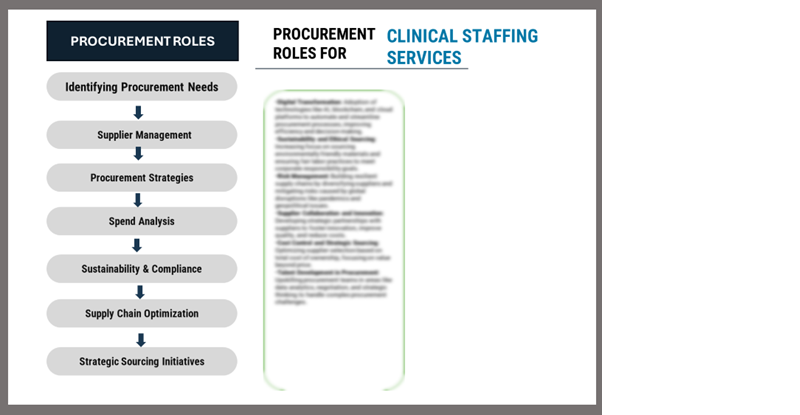
Pricing Outlook for Clinical Staffing Services: Spend Analysis
The pricing outlook for clinical staffing services is expected to remain relatively stable, though periodic fluctuations may arise due to several influencing factors. Changes in operational costs, such as wages, training investments, and regulatory compliance requirements, can significantly impact price trends. Furthermore, the rising demand for specialized clinical roles and flexible staffing models is contributing to pricing pressures.
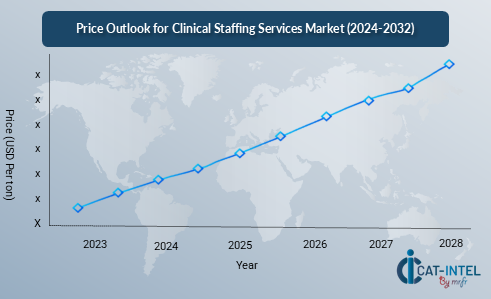
Graph shows general upward trend pricing for clinical staffing services and growing demand. However, there may be fluctuations influenced by economic conditions, technological advancements, and competitive dynamic.
Efforts to enhance operational efficiency, reduce administrative overheads, and adopt digital recruitment platforms are critical for managing costs. The implementation of innovative workforce management solutions and continuous professional development initiatives can help address pricing challenges.
Collaboration with staffing agencies, investments in digital sourcing platforms, and optimizing recruitment processes are essential strategies for controlling costs. Despite these challenges, maintaining a strong focus on employee satisfaction, regulatory compliance, and leveraging technological advancements will be key to effectively managing pricing dynamics.
Cost Breakdown for Clinical Staffing Services: Total Cost of Ownership (TCO) and Cost-Saving Opportunities
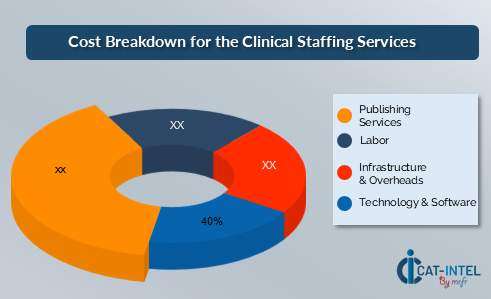
- Technology & Software (40%)
- Description: Investments include applicant tracking systems, AI-driven matching tools, and digital onboarding platforms. These technologies are essential for streamlining the recruitment process, improving candidate quality, and reducing time-to-hire.
- Trends: Increased adoption of AI and machine learning for talent matching, use of cloud-based systems for scalable operations, and enhanced focus on data security to ensure compliance and efficiency.
- Labor (XX%)
- Publishing Services (XX%)
- Infrastructure & Overheads (XX%)
Cost-Saving Opportunities: Negotiation Levers and Purchasing Negotiation Strategies
In the clinical staffing services industry, streamlining procurement processes and improving workforce management can result in substantial cost savings and enhanced service delivery. Building long-term partnerships with staffing agencies, training providers, and recruitment technology vendors can help secure competitive pricing, reduce fees, and enhance operational efficiency. Collaborative relationships with talent acquisition firms and digital platform providers can offer benefits such as flexible payment terms, scalable staffing solutions, and cost-effective workforce management services.
Investments in digital recruitment platforms, AI-driven talent matching tools, and cloud-based workforce management systems can reduce operational costs, minimize recruitment errors, and accelerate the hiring process. Additionally, implementing remote working technologies and optimizing digital resources can further reduce infrastructure-related expenses. Multi-sourcing strategies, including diversifying recruitment channels and leveraging competitive bidding, can mitigate risks related to talent shortages and strengthen negotiating positions.
Supply and Demand Overview for Clinical Staffing Services: Demand-Supply Dynamics and Buyer Intelligence for Effective Supplier Relationship Management (SRM)
The clinical staffing services market is witnessing steady growth, fueled by increasing demand from sectors such as healthcare, pharmaceuticals, and research. The interplay between supply and demand is influenced by factors such as workforce trends, technological innovations, and regulatory developments.
Demand Factors:
-
Workforce Specialization: Growing demand for skilled clinical professionals, including nurses, technicians, and researchers, as organizations seek to address specific industry needs. -
Flexible Staffing Models: Increasing need for temporary and project-based staffing to meet fluctuating demand in healthcare and research sectors. -
Regulatory Compliance: Rising demand for certified professionals and compliance with industry standards to meet stringent regulatory requirements. -
Technological Integration: Organizations are seeking staffing solutions aligned with digital platforms and technologies to enhance operational efficiency.
Supply Factors:
-
Talent Pool Availability: Availability of skilled and experienced clinical staff, including specialized roles in emerging fields like biotechnology and telemedicine. -
Digital Recruitment Innovations: Advancements in recruitment technology, such as AI-driven tools, are enabling faster and more accurate talent matching. -
Training and Certification Programs: Increasing emphasis on continuous training and certifications to maintain a competent and compliant workforce. -
Vendor Competition: Intense competition among staffing service providers is driving improvements in service quality, faster fulfilment, and competitive pricing, benefiting buyers.
Regional Demand Supply Outlook: Clinical Staffing Services
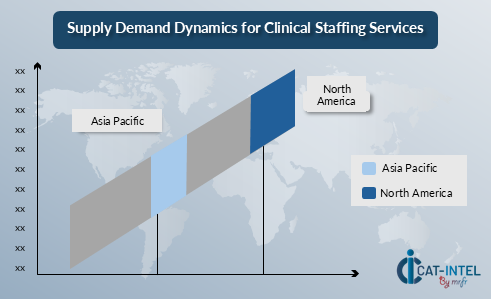
The Image shows growing demand for clinical staffing services in both North America and Asia Pacific with potential price increases and increased Competition.
North America: Dominance in Clinical Staffing Services
North America, particularly the United States and Canada, plays a leading role in the global clinical staffing market, driven by several critical factors:
-
Advanced Recruitment Technologies: North America is home to some of the world’s leading providers of digital recruitment platforms and workforce management tools, offering cutting-edge solutions powered by automation and AI. -
Comprehensive Regulatory Framework: The region's stringent regulatory environment requires high standards in recruitment and workforce management, making it a hub for specialized, compliant staffing solutions. -
Skilled Workforce and Innovation: North America benefits from a highly educated and experienced talent pool, coupled with a culture of continuous innovation, enabling organizations to meet industry demands and implement advanced workforce management strategies. -
Market Size and Growth: The North American market represents the largest consumer of clinical staffing services, driven by significant demand from the healthcare and pharmaceutical sectors. Additionally, the region serves as a key exporter of recruitment technologies and workforce solutions to other regions, including Europe and Asia.
Supplier Landscape: Supplier Negotiations and Strategies
The supplier landscape in the clinical staffing services market is highly competitive, comprising a mix of large global staffing firms and smaller, specialized agencies catering to specific healthcare and pharmaceutical sectors. These suppliers significantly influence key market elements such as pricing, service quality, and workforce availability. The market features prominent players with extensive networks alongside niche providers delivering specialized staffing solutions for roles in nursing, allied health, and clinical research.
In regions with high demand for clinical staffing services, the supplier landscape is diverse, with both established agencies and emerging providers meeting global and local needs. As the demand for flexible, skilled, and cost-effective clinical staffing solutions grows, suppliers are focusing on digital recruitment innovations, workforce management enhancements, and strategic partnerships to strengthen their market positions. Additionally, a strong focus on regulatory compliance, workforce certifications, and data privacy is driving suppliers to refine their offerings to align with evolving industry requirements.
Key Suppliers in the Clinical Staffing Services Market Include:
- AMN Healthcare
- Cross Country Healthcare
- Maxim Healthcare Services
- Aya Healthcare
- CHG Healthcare
- Jackson Healthcare
- Medical Solutions
- HealthTrust Workforce Solutions
- Soliant Health
- Med Pro Healthcare Staffing
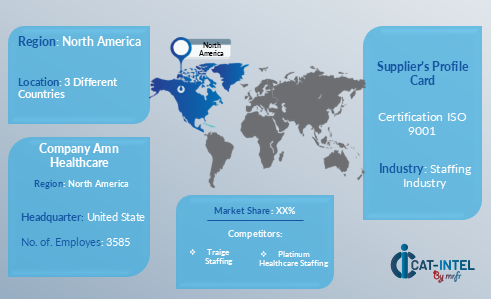
Key Developments Procurement Category Significant Development:
Significant Development |
Description |
Market Growth |
The global clinical staffing services market is experiencing growth, driven by rising demand from sectors such as healthcare, pharmaceuticals, and research. |
Sustainable Practices |
Increasing focus on ethical recruitment practices, compliance with labor regulations, and promoting diversity and inclusion in clinical staffing to meet industry standards and societal expectations. |
Service Diversification |
Expansion of clinical staffing services, including temporary, permanent, and project-based staffing solutions, to address the evolving needs of healthcare and research organizations. |
Technological Innovations |
Adoption of advanced technologies, such as AI-driven talent matching, digital onboarding platforms, and cloud-based workforce management systems, enhancing efficiency, accuracy, and hiring processes. |
E-commerce Expansion |
Growth in digital platforms for recruitment services, streamlining access to talent pools and improving the efficiency of staffing operations across various industries. |
Focus on Efficiency |
Rising demand for faster, more efficient staffing processes, such as automated candidate sourcing and real-time availability tracking, to meet the needs of employers for quick workforce deployment. |
Clinical Staffing Service Attribute/Metric |
Details |
Clinical Staffing Service Market Sizing |
The global clinical staffing services market is projected to reach USD 70.13 billion by 2032, growing at a CAGR of approximately 7.6 % from 2024 to 2032. |
Technology Adoption Rate in Clinical Staffing |
Approximately 35% of companies in the clinical staffing industry are adopting advanced technologies, such as AI-driven talent matching and cloud-based workforce management systems, to enhance recruitment efficiency and service accuracy. |
Top Clinical Staffing Strategies for 2024 |
Emphasis on digital transformation, compliance with labor regulations, leveraging AI for candidate selection, and improving workforce management systems to meet client needs. |
Clinical Staffing Process Automation |
25% of clinical staffing firms have automated key processes such as candidate sourcing, onboarding, and scheduling, to improve efficiency and reduce time-to-fill. |
Clinical Staffing Challenges |
Major challenges include addressing talent shortages, ensuring compliance with labor laws, adapting to shifting workforce preferences, and managing fluctuating client demands. |
Key Suppliers |
Leading suppliers in the clinical staffing market include AMN Healthcare, Cross Country Healthcare, CHG Healthcare, Aya Healthcare, and Jackson Healthcare, offering comprehensive staffing solutions for various healthcare sectors. |
Key Regions Covered |
North America, Europe, and Asia-Pacific dominate the clinical staffing market, driven by strong demand from healthcare, pharmaceutical, and research sectors. |
Market Drivers and Trends |
Growth is driven by increasing demand for skilled clinical professionals, advancements in digital recruitment platforms, rising focus on diversity and inclusion, and stricter compliance requirements in healthcare and research sectors. |










